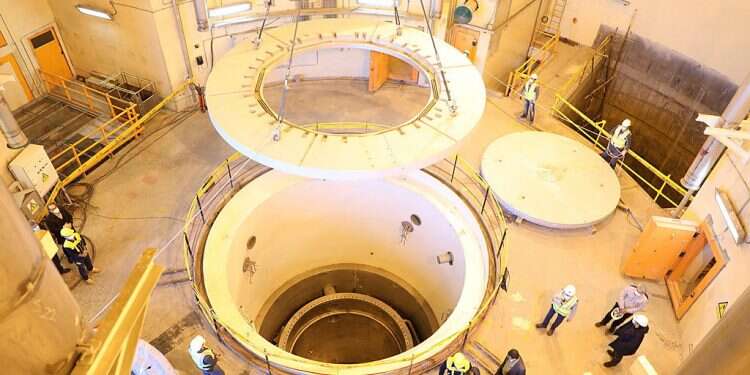Unless the West changes its approach to Iran, it will soon become a nuclear threshold state. This does not mean that Tehran will actually build a nuclear bomb, but it is doing its utmost to have the capabilities to do so in the shortest possible time once it makes that decision.
Follow Israel Hayom on Facebook and Twitter
In the last few months, Iran has made significant progress in enriching uranium to 60% and beyond. From there, it would be a small leap to a weapons-grade enrichment of 90%. Based on estimates, if the Iranian government decides to produce enough fissile material for a nuclear bomb, it will be able to do so in a matter of weeks, assuming no one will get in the way.
However, enriched uranium alone is not enough to build a nuclear bomb. Tehran will also have to complete the development of its nuclear sites, conduct experiments and complete its long-range missile project. Based on estimates, it will take Iran one to two years to do so, assuming no other country gets in the way.
Officials in Israel say that Iran is currently pursuing its nuclear goals at a minimum pace so as not to set off Western countries into reimposing heavy economic sanctions on the regime or threaten it with military action.
Much to Washington's dismay, the resumption of the nuclear talks depends almost entirely on Tehran, which deliberately continues to stall.
The US hoped that following former President Donald Trump's policy of "maximum pressure" on Iran – which took the regime's economy back 15 years – it would quickly agree to return to the original 2015 Joint Comprehensive Plan of Action, and would even be open to agreeing on a new and improved deal.
In reality, the Biden administration's willingness to ease some of the sanctions has helped Iran's economy to the point that its leaders no longer fear civil unrest and have moved ahead with its nuclear program. It has also given the regime too much leeway in the nuclear talks.
Washington also hoped that newly-elected Iranian President Ebrahim Raisi would quickly resume the negotiations, but in reality, it has been more than two months since he took office and talks have still not resumed.
Despite the frustrations, the Biden administration is reluctant to impose sanctions on Iran, certainly severe ones, and, as a result, Washington has found itself without an alternative plan of action and at the mercy of Tehran.
Many in Israel are concerned about the current state of affairs. While some felt encouraged by Washington's attention to Jerusalem's concerns with regard to Iran, most felt frustrated by the Biden administration's lack of action to pressure Iran to return to the nuclear deal.
Having said that, Israel is of the opinion that the JCPOA that the US wants Iran to return to is far from perfect, to say the least, as it allows Iran to legally lay its hands on a nuclear bomb within a decade. However, the current situation – with its lack of agreements and sanctions – is even worse.
According to foreign news outlets, Israel has taken several means to delay the Iranian nuclear program, including targeting the Natanz nuclear facility. However, according to estimates, it only delayed Iran by a mere few weeks or months.
As a result of all the above mentioned, the Israel Defense Forces has in recent months began to prepare plans to address the Iranian threat, and has even received a budget for this from the Finance Ministry.
The problem is that the plan is too complex, and its effectiveness is questionable, and proving otherwise will take quite some time, during which Iran will be able to make significant progress.
Jerusalem continues to hope that a combined, economic and operational move will at least pressure Iran into returning to the first phase of the JCPOA, giving the IDF time to complete its preparations for an attack. At the same time, Israel plans to encourage the West, especially the US, to adopt a more decisive approach to Iran.
Subscribe to Israel Hayom's daily newsletter and never miss our top stories!




